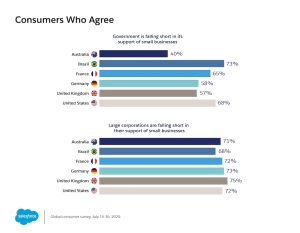Today, Salesforce published the fourth edition of its Small & Medium Business Trends Report. This research was conducted in two parts, with a study in March 2020 and a follow-up study in August 2020, providing insights from SMB owners and leaders at the beginning and in the midst of the pandemic.
This year has presented challenges for businesses of all sizes, and small and medium businesses (SMB) have experienced more than their share. This research gives us the most up-to-date look at how, six months in, SMB owners and leaders are weathering overlapping health, economic, and racial injustices crises, and adapting to the current climate.
The research included more than 2,300 SMB owners and leaders in North America, South America, Europe, and Asia Pacific. Small and medium-sized businesses are defined as 2-200 employees and an annual revenue of less than $1 billion.
“Small businesses have always been a critical part of our economy, and it’s especially important that we support them during this pandemic,” said Meredith Schmidt, GM and EVP, Essentials and SMB. “We hope these insights give SMB leaders around the world inspiration on how other businesses are navigating this challenging period and achieving resilience. I am optimistic that SMBs will and can move forward with grit and creativity.”
Some key insights from the Small & Medium Business Trends Report include:
Customer focus remains a key trait of growing SMBs
Growing SMBs, defined as having 1% or more revenue increase over the last six months, are most likely to have taken actions to improve customer interactions since the pandemic took hold. They also seem better poised to offer customers flexibility, such as, easier return policies and payment plans. In addition, growing SMBs are more likely to prioritize developing stronger customer relationships over one-time transactions.
SMB optimism persists amid new challenges
Many SMBs were hit particularly hard by the pandemic due to their already-short runway on resources. The top three constraints on current business operations continue to be money/access to capital, meeting customer expectations, and hiring the right talent — all of which are the same as early on in the pandemic, in March.
However, COVID-19 has added compounding challenges as well — reduced revenue, reduced customer demand, and public health mandates are ranked the top three pandemic-related challenges constraining businesses. Not surprisingly, 3 in 5 SMB leaders say local mandates to close or limit operations are threatening the viability of their business or that compliance with public health requirements creates an excessive burden.
Even with these challenges, 22% of SMBs say they are very optimistic and 50% of SMBs say they are somewhat optimistic about the future of their business.
Digital-forward SMBs are more equipped to handle market volatility
SMBs’ use of technology has continued to increase over the years, with more than half now saying they use a customer relationship management system, a 24% increase from 2019. Even during the pandemic, SMBs are continuing to adopt new technology, with at least 1 in 5 SMB leaders reporting they’ve implemented at least one of the following technology solutions in the last six months, including email marketing software, customer service software, project task collaboration tools, or e-commerce software. Around another 1 in 5 SMB leaders don’t currently use these solutions but have plans to in the next 12 months. In addition, SMB leaders have been steadily using fewer applications over the past year and nearly three quarters (72%)* believe that one centralized application to manage their business functions would be helpful.
Country Trends
Despite the significant impact of the pandemic on businesses across the world, SMB owners remain seemingly optimistic across the board, with all countries sharing expectations of business as usual following the pandemic, or only slight modifications. The majority of SMB leaders in the US (43%), Germany (46%), Thailand (44%) and Australia/New Zealand (51%) expect business as normal, while slightly modified business was the most commonly expected outcome in Brazil (47%), Canada (51%), UK/Ireland (45%), as well as Spain and Italy (59%) among others. However, when SMB leaders are thinking about the future of their business, applying for financial assistance and decreasing staff were cited as two of the top three considerations by every country.
For a deeper analysis of findings, visit our blog and download the full Small & Medium Business Trends Report.
*Responses from the March 2020 survey.
Methodology
An initial survey was conducted online by The Harris Poll on behalf of Salesforce, between February 28 and March 18, 2020 among 2,411 SMB owners and leaders, and a follow-up study was conducted six months later between August 7 and 31, 2020 among 2,377 SMB owners and leaders in North America, South America, Europe, and Asia Pacific. Respondents are 18 years of age or older, employed full-time, part-time, or self-employed, and owners or senior executives at their businesses with 2-200 employees and annual revenue of less than $1 billion.
Data points were weighted by number of employees to bring them into line with actual company size proportions in the population. This online survey is not based on a probability sample and therefore no estimate of theoretical sampling error can be calculated.
In both the March and August 2020 studies, the following countries were included: US, Canada, Brazil, UK/Ireland, Spain, France, Germany, Italy, Netherlands, India, Philippines, Singapore, Thailand, and Australia/NZ
In the 2019 study, also referenced in the report, the following countries were included: US, UK/Ireland, France, Germany, India, Singapore, and Australia/NZ.
All respondents are third-party panelists (not limited to Salesforce customers).






















